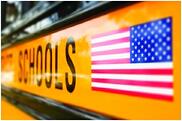 Some students and parents in the Jefferson County school district near Denver, Colorado, area are mad. The conservatives on the board have sparked a strong debate in their community, but it's a struggle that is occurring in many other states as well.
Some students and parents in the Jefferson County school district near Denver, Colorado, area are mad. The conservatives on the board have sparked a strong debate in their community, but it's a struggle that is occurring in many other states as well.
A Conservative-led School Board
The focal issue featured in the news stories is that the school board is led by conservatives. By definition, a "conservative" is one who supports long-held values and attitudes (i.e., common sense), approaching change with caution. A majority of the board members in Jefferson County are now of this idealogical persuasion, most likely elected because of their commitment to conservative positions.
According to the Center for Public Education, the role of the school board includes providing for the best interests of students through a high quality education, deciding which school programs to fund and implement, incorporate the various viewpoints of the community regarding curriculum, and ensuring accountability for results. As duly elected board members, how much influence should their personal opinion and beliefs have on votes compared with those mostly loudly expressed in public forums? Should board leaders adjust their decisions based on the volume and/or majority of people in the community?
Traditional History Education
What is the "change" that has the conservatives so concerned? The board wants history education in the district to "promote citizenship, patriotism, essentials and benefits of the free-market system, respect for authority and respect for individual rights." They want teachers to present positive aspects of the United States and its heritage. The board has proposed the establishment of a committee to regularly review texts and course plans, starting with Advanced Placement history, to make sure the curriculum doesn't "encourage or condone civil disorder, social strife or disregard of the law." Is this really so outrageous?
Conservatives in other states have also advocated for the College Board to rewrite their framework for AP history classes to make sure there is no ideological bias. History curriculum is significantly influenced by the background, inclination, preferences, and prejudices of the teacher--always has been, always will be. Isn't it reasonable to expect school boards in communities where there is a strong commitment to patriotism and the "American Way" to resist a historical perspective that is contrary?
Values & Attitudes
Conservatives generally believe in personal responsibility, less government, free enterprise, individual liberty, and "traditional" American values. They advocate for the government to provide citizens the freedoms necessary to pursue their own goals and path to happiness. Conservative policies generally emphasize empowerment of the individual to solve problems. If that's the problem with conservative school boards, then Jefferson County may be in a better place than many other communities around the U.S.


